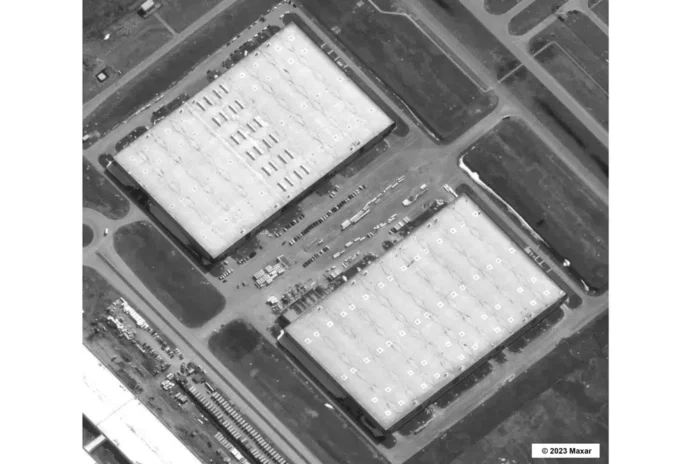Washington (AP) – In a recent U.S. intelligence finding released by the White House, Iran has been implicated in providing Russia with crucial materials to construct a drone manufacturing plant in the vicinity of Moscow. This collaboration is believed to be a strategic move by the Kremlin to ensure a steady supply of weaponry for its ongoing invasion of Ukraine.
According to National Security Council spokesman John Kirby, U.S. intelligence officials have determined that the drone manufacturing plant, situated in Russia’s Alabuga special economic zone, could become operational as early as next year. Accompanying the intelligence release, satellite imagery captured in April offers a glimpse into the industrial location several hundred miles east of Moscow, pinpointing the likely site for the anticipated plant.
The Biden administration had previously indicated in December that it suspected Iran and Russia were exploring the establishment of a drone assembly line in Russia for the purpose of the Ukraine conflict. The latest intelligence findings now suggest that the project, specifically located in the Yelabuga region of Tatarstan, has advanced beyond the conceptual stage.
Notably, Iran claims to have provided drones to Russia before the commencement of the war but denies any recent involvement. However, U.S. officials, in their assessment, have concluded that Iran continues to supply the Russian military with one-way attack drones produced within Iran itself. These drones are transported via the Caspian Sea from Amirabad in Iran to Makhachkala, Russia, and subsequently employed by Russian forces against Ukraine.
As per the White House report, hundreds of these Iranian-built attack drones, along with drone production-related equipment, have been received by Russia as of May. This robust defense partnership between Iran and Russia has raised concerns about its detrimental impact on Ukraine, Iran’s neighboring countries, and the international community at large.
National Security Council spokesman John Kirby emphasized, “This is a full-scale defense partnership that is harmful to Ukraine, to Iran’s neighbors, and to the international community. We are continuing to use all the tools at our disposal to expose and disrupt these activities including by sharing this with the public — and we are prepared to do more.”
To address the inadvertent contribution to Iran’s drone program, the Biden administration is set to announce a new advisory on Friday. The advisory aims to assist businesses and other governments in implementing measures that ensure they do not unintentionally facilitate Iran’s drone-related activities. In recent months, the United States, the European Union, and the United Kingdom have all issued regulations intended to impede the flow of drone components to Russia and Iran.
This continuous release of intelligence findings by the Biden administration serves to shed light on the deepening defense partnership between Russia and Iran, as well as to draw attention to Moscow’s conduct in the ongoing Ukraine conflict. The administration hopes that by raising awareness, it will further encourage global isolation of Russia.
Moreover, the White House recently revealed that Russia is seeking to procure additional advanced attack drones from Iran, following the depletion of most of the 400 drones it had previously acquired from Tehran.
While the United States has long asserted that Iran had been considering the sale of hundreds of ballistic missiles to Russia, there is no concrete evidence to suggest that such a deal has been finalized.
It is worth noting that Iran is also in pursuit of purchasing various military equipment from Russia, including attack helicopters, radars, and YAK-130 combat trainer aircraft. In April, Iran announced the completion of a deal to acquire Su-35 fighter jets from Russia, further cementing their defense cooperation.
As tensions continue to escalate in Ukraine, the revelations surrounding Iran’s involvement in assisting Russia’s drone factory underscore the complex dynamics and growing concerns within the international community.






